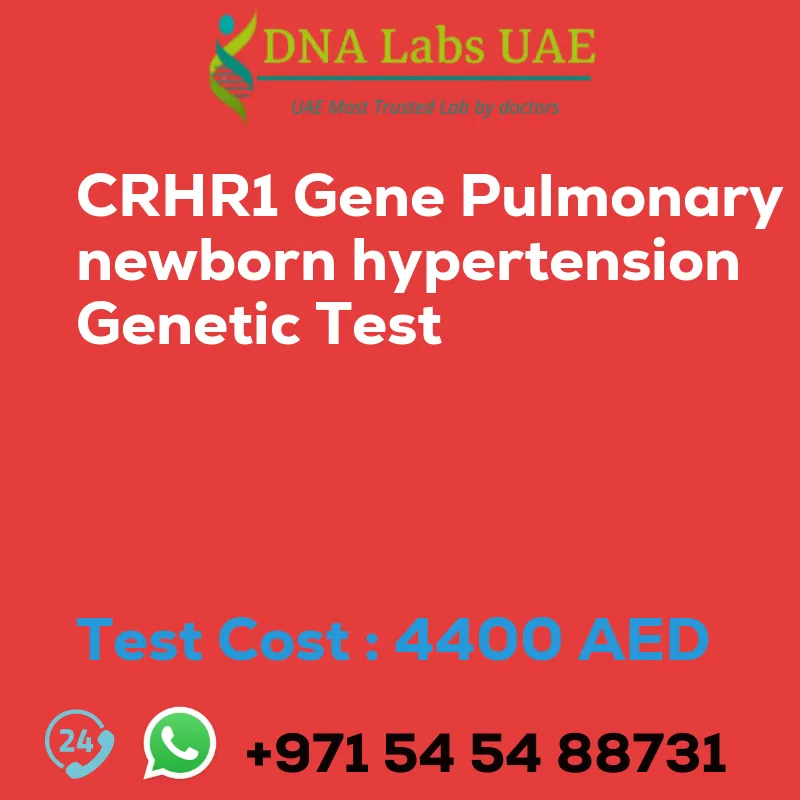CRHR1 Gene Pulmonary Newborn Hypertension Genetic Test
Test Name: CRHR1 Gene Pulmonary Newborn Hypertension Genetic Test
Components: Blood or Extracted DNA or One drop Blood on FTA Card
Price: 4400.0 AED
Sample Condition: Blood or Extracted DNA or One drop Blood on FTA Card
Report Delivery: 3 to 4 Weeks
Method: NGS Technology
Test Type: Cardiovascular Pneumology Disorders
Doctor: Cardiologist
Test Department: Genetics
Pre Test Information: Clinical History of Patient who is going for CRHR1 Gene Pulmonary newborn hypertension NGS Genetic DNA Test. A Genetic Counselling session to draw a pedigree chart of family members affected with CRHR1 Gene Pulmonary newborn hypertension NGS Genetic DNA Test gene CRHR1
Test Details
The CRHR1 gene is responsible for encoding the corticotropin-releasing hormone receptor 1, which plays a role in the body’s stress response system. Mutations or variations in this gene have been associated with various health conditions, including pulmonary hypertension.
Pulmonary hypertension is a condition characterized by high blood pressure in the arteries of the lungs. It can be caused by a variety of factors, including genetic mutations. The CRHR1 gene has been implicated in the development of pulmonary hypertension, although the specific mechanisms are not fully understood.
NGS (Next-Generation Sequencing) genetic testing is a technique used to analyze multiple genes simultaneously and identify genetic variations or mutations that may be associated with certain health conditions. In the context of pulmonary hypertension, NGS genetic testing can be used to identify any mutations or variations in the CRHR1 gene that may contribute to the development of the condition.
By identifying these genetic variations, healthcare providers can gain a better understanding of the underlying causes of pulmonary hypertension in newborns and potentially develop targeted treatment strategies. However, it is important to note that genetic testing is just one piece of the puzzle, and other factors such as environmental factors and lifestyle choices can also contribute to the development of pulmonary hypertension.
Therefore, genetic testing should be interpreted in conjunction with other clinical information to provide a comprehensive understanding of the condition.
| Test Name | CRHR1 Gene Pulmonary newborn hypertension Genetic Test |
|---|---|
| Components | |
| Price | 4400.0 AED |
| Sample Condition | Blood or Extracted DNA or One drop Blood on FTA Card |
| Report Delivery | 3 to 4 Weeks |
| Method | NGS Technology |
| Test type | Cardiovascular Pneumology Disorders |
| Doctor | Cardiologist |
| Test Department: | Genetics |
| Pre Test Information | Clinical History of Patient who is going for CRHR1 Gene Pulmonary newborn hypertension NGS Genetic DNA Test. A Genetic Counselling session to draw a pedigree chart of family members affected with CRHR1 Gene Pulmonary newborn hypertension NGS Genetic DNA Test gene CRHR1 |
| Test Details | The CRHR1 gene is responsible for encoding the corticotropin-releasing hormone receptor 1, which plays a role in the body’s stress response system. Mutations or variations in this gene have been associated with various health conditions, including pulmonary hypertension. Pulmonary hypertension is a condition characterized by high blood pressure in the arteries of the lungs. It can be caused by a variety of factors, including genetic mutations. The CRHR1 gene has been implicated in the development of pulmonary hypertension, although the specific mechanisms are not fully understood. NGS (Next-Generation Sequencing) genetic testing is a technique used to analyze multiple genes simultaneously and identify genetic variations or mutations that may be associated with certain health conditions. In the context of pulmonary hypertension, NGS genetic testing can be used to identify any mutations or variations in the CRHR1 gene that may contribute to the development of the condition. By identifying these genetic variations, healthcare providers can gain a better understanding of the underlying causes of pulmonary hypertension in newborns and potentially develop targeted treatment strategies. However, it is important to note that genetic testing is just one piece of the puzzle, and other factors such as environmental factors and lifestyle choices can also contribute to the development of pulmonary hypertension. Therefore, genetic testing should be interpreted in conjunction with other clinical information to provide a comprehensive understanding of the condition. |







